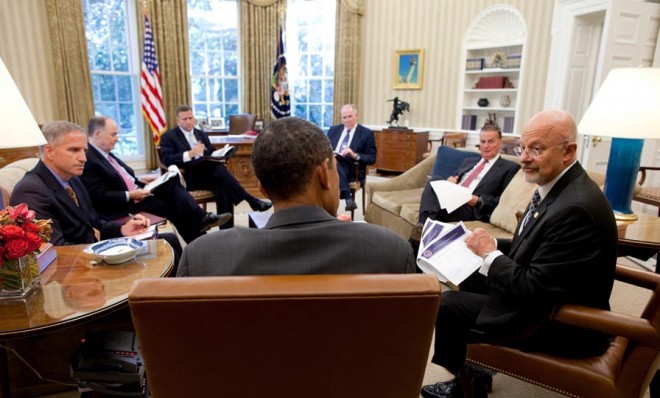Report: Obama ordered his team to ID potential overseas cyberattack targets
Another White House leak sheds more light on the government's top-secret national security policies


A free daily email with the biggest news stories of the day – and the best features from TheWeek.com
You are now subscribed
Your newsletter sign-up was successful
In yet another major disclosure of the White House's clandestine intelligence operations, the Guardian reported Friday that President Obama ordered his national security team to create a list of potential foreign targets for cyberattacks.
An 18-page directive issued last October called for the government to "identify potential targets of national importance where OCEO [Offensive Cyber Effects Operations] can offer a favorable balance of effectiveness and risk as compared with other instruments of national power."
From the Guardian:
The Week
Escape your echo chamber. Get the facts behind the news, plus analysis from multiple perspectives.

Sign up for The Week's Free Newsletters
From our morning news briefing to a weekly Good News Newsletter, get the best of The Week delivered directly to your inbox.
From our morning news briefing to a weekly Good News Newsletter, get the best of The Week delivered directly to your inbox.
The directive also contemplates the possible use of cyber actions inside the US, though it specifies that no such domestic operations can be conducted without the prior order of the president, except in cases of emergency.
The aim of the document was "to put in place tools and a framework to enable government to make decisions" on cyber actions, a senior administration official told the Guardian.
…
Asked about the stepping up of US offensive capabilities outlined in the directive, a senior administration official said: "Once humans develop the capacity to build boats, we build navies. Once you build airplanes, we build air forces." [Guardian]
The disclosure caps a three-day whirlwind of explosive leaks that offered controversial new details about the administration's national security and intelligence gathering policies. Late Wednesday, the Guardian broke the news that the administration had secretly collected phone records for millions of Verizon customers. And Thursday, both the Guardian and Washington Post reported that the government had direct access to the servers of nine major tech companies — including Google, Facebook, and Apple — and used that access to pull troves of personal information in a program called PRISM.
The latest revelation comes on the same day the president is to meet with Chinese President Xi Jinping to discuss cyber warfare. The Pentagon has accused China of launching cyberattacks against the U.S. in the past, and Obama was reportedly set to demand that China cease such behavior.
A free daily email with the biggest news stories of the day – and the best features from TheWeek.com
Jon Terbush is an associate editor at TheWeek.com covering politics, sports, and other things he finds interesting. He has previously written for Talking Points Memo, Raw Story, and Business Insider.
-
 Film reviews: ‘Send Help’ and ‘Private Life’
Film reviews: ‘Send Help’ and ‘Private Life’Feature An office doormat is stranded alone with her awful boss and a frazzled therapist turns amateur murder investigator
-
 Movies to watch in February
Movies to watch in Februarythe week recommends Time travelers, multiverse hoppers and an Iraqi parable highlight this month’s offerings during the depths of winter
-
 ICE’s facial scanning is the tip of the surveillance iceberg
ICE’s facial scanning is the tip of the surveillance icebergIN THE SPOTLIGHT Federal troops are increasingly turning to high-tech tracking tools that push the boundaries of personal privacy
-
 The billionaires’ wealth tax: a catastrophe for California?
The billionaires’ wealth tax: a catastrophe for California?Talking Point Peter Thiel and Larry Page preparing to change state residency
-
 Bari Weiss’ ‘60 Minutes’ scandal is about more than one report
Bari Weiss’ ‘60 Minutes’ scandal is about more than one reportIN THE SPOTLIGHT By blocking an approved segment on a controversial prison holding US deportees in El Salvador, the editor-in-chief of CBS News has become the main story
-
 Has Zohran Mamdani shown the Democrats how to win again?
Has Zohran Mamdani shown the Democrats how to win again?Today’s Big Question New York City mayoral election touted as victory for left-wing populists but moderate centrist wins elsewhere present more complex path for Democratic Party
-
 Millions turn out for anti-Trump ‘No Kings’ rallies
Millions turn out for anti-Trump ‘No Kings’ ralliesSpeed Read An estimated 7 million people participated, 2 million more than at the first ‘No Kings’ protest in June
-
 Ghislaine Maxwell: angling for a Trump pardon
Ghislaine Maxwell: angling for a Trump pardonTalking Point Convicted sex trafficker's testimony could shed new light on president's links to Jeffrey Epstein
-
 The last words and final moments of 40 presidents
The last words and final moments of 40 presidentsThe Explainer Some are eloquent quotes worthy of the holders of the highest office in the nation, and others... aren't
-
 The JFK files: the truth at last?
The JFK files: the truth at last?In The Spotlight More than 64,000 previously classified documents relating the 1963 assassination of John F. Kennedy have been released by the Trump administration
-
 'Seriously, not literally': how should the world take Donald Trump?
'Seriously, not literally': how should the world take Donald Trump?Today's big question White House rhetoric and reality look likely to become increasingly blurred
